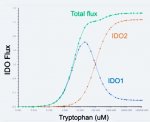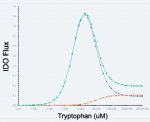https://www.omf.ngo/2020/04/26/kynurenine-clinical-trial-for-me-cfs/
Anybody know anything about this? Do you think Kyn. is administered orally or via IV?
Anybody know anything about this? Do you think Kyn. is administered orally or via IV?

Welcome to Phoenix Rising!
Created in 2008, Phoenix Rising is the largest and oldest forum dedicated to furthering the understanding of, and finding treatments for, complex chronic illnesses such as chronic fatigue syndrome (ME/CFS), fibromyalgia, long COVID, postural orthostatic tachycardia syndrome (POTS), mast cell activation syndrome (MCAS), and allied diseases.
To become a member, simply click the Register button at the top right.
Robert Phair's metabolic trap hypothesis.

 Deleterious IDO2 SNPs:
Deleterious IDO2 SNPs: 
Agh, sorry to mislead, I'd just happened (at the time of making this reply) to scribble onto the diagram the altered levels of my own metabolites that I'd had tested, for reference... I should have made a new diagram really...Why is Tryptophan going down in that image
Sorry, I meant to say that I know it likely has to be a test of Phair's Metabolic Trap (kynurenine is what IDO makes from tryptophan), but how does it fit into the metabolic trap theory. Is it really as simple of providing more of the product in the pathway to try and shift the reaction leftward by balancing it? So, the concentration of tryptophan (relative to amount/concentration of kynurenine) is lower, thus moving IDO to the left of the hump/trap? I'd like more details how providing kynurenine would affect IDO1. Modeling the effect of adding kynurenine, I'd think, would be fairly simple. So hopefully, Phair has a good expectation of it helping.Yes, I would like to know the rational for choosing Kynurenine for use in a trial and what they're looking at. What's the hypothesized mechanism or outcome they're examining.
The latter. I don't think you can buy kynurenine as a supplement.What I wonder about the trial is: is it being done because a significant number of PWME reported feeling better after taking KYN, or is it just a 'sounds theoretically good enough to get funding' trial?
I don't think you can buy kynurenine as a supplement
I have been wondering whether limiting the intake of tryptophan may help our bodies bring the levels down themselves quite slowly. Then if tryptophan concentration lowers, the IDO1 enzyme would become more active again, increasing kynurenine and removing us from the metabolic trap.
From my investigating papers, it seems as though by ingesting high doses of various other amino acids that compete for absorption with tryptophan, it is possible to decrease the level of tryptophan being absorbed by our bodies.
This would explain why so many people have benefitted from taking high doses of BCAAs (like @Mary ) and proteins like collagen which do not contain tryptophan. This also seems as though it would be a lot safer to try than trying to find kynurenine and supplement with that.
Does my logic make sense to you or am I missing something? I have ordered some BCAAs to see if they improve my PEM when taken at each meal